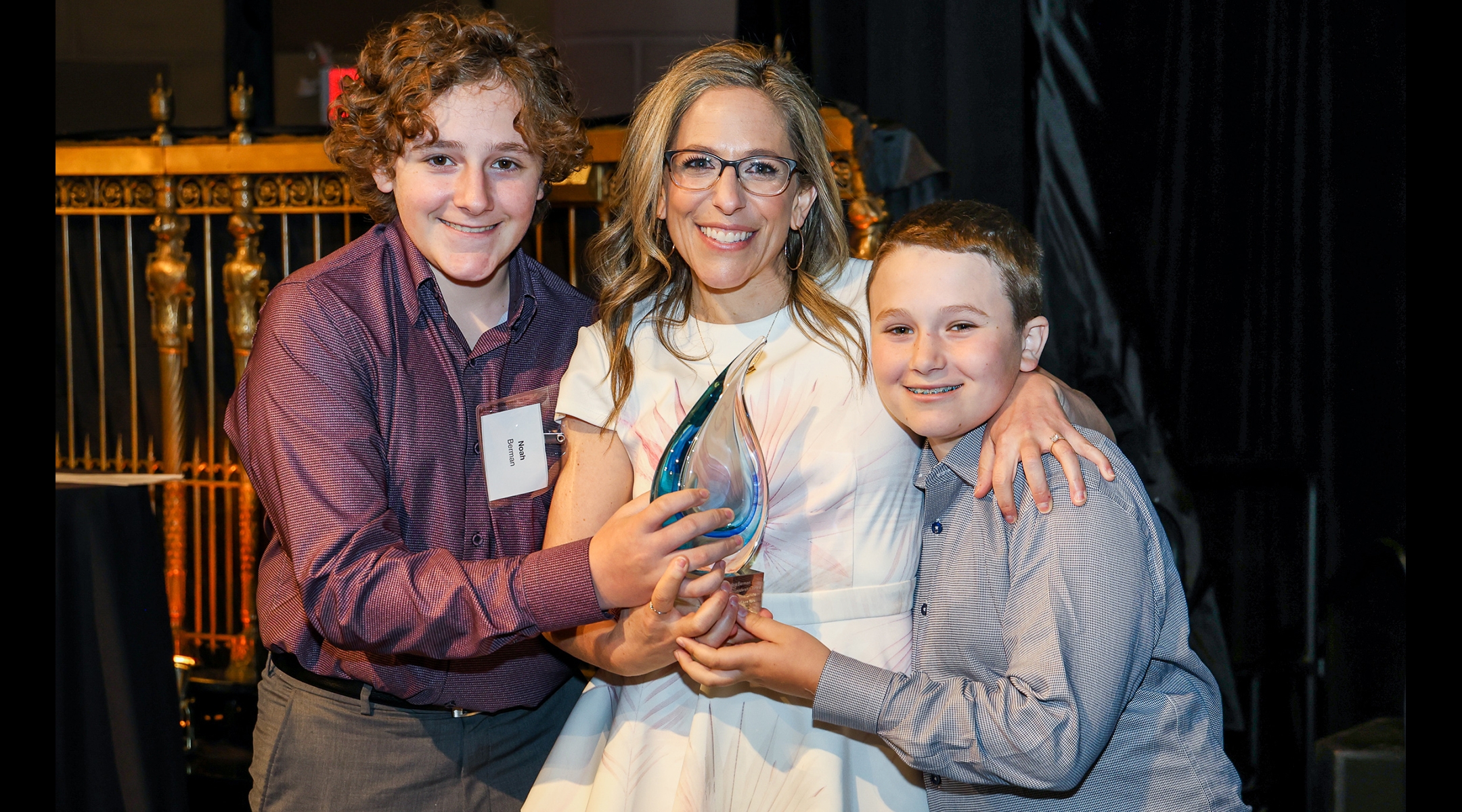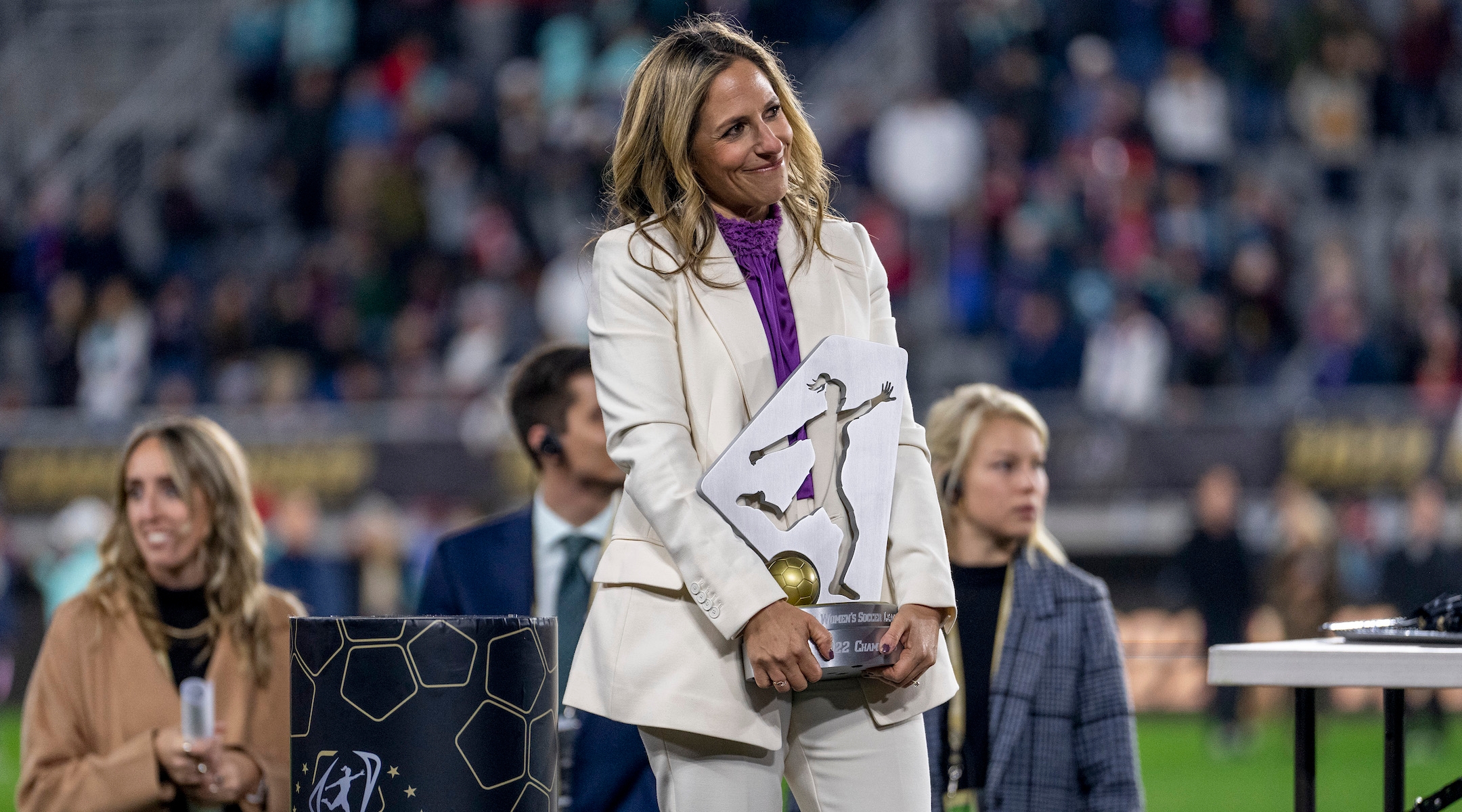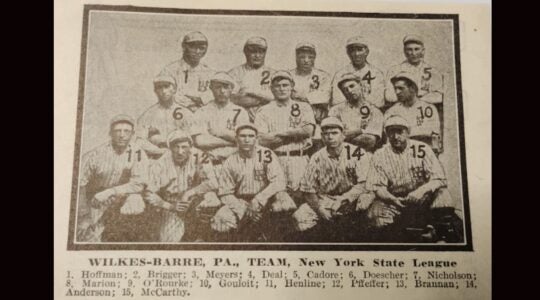(JTA) — Some sports fans collect trading cards. Others collect autographs. You could say Jessica Berman collects sports leagues.
Berman, a Jewish day school alum with deep roots in New York’s Jewish community, took the reins of the National Women’s Soccer League in April 2022. It was the latest stop in a decorated and pioneering front-office career that has included prominent positions with the National Lacrosse League and the National Hockey League — as well as a portfolio as a labor lawyer that included work with the NBA, NFL and MLB.
The National Women’s Soccer League, which held its inaugural season in 2013, currently has 12 teams and a regular season that runs from March through October. Berman stepped in at a crucial time for the league, which was navigating the a major sex abuse scandal in 2021 that led to lifetime bans for four coaches and the resignation of one of Berman’s predecessors.
In addition to managing the fallout from that scandal, Berman is charged with presiding over the league’s continued growth. The NWSL added two teams in 2022 and plans to expand to 16 teams by 2026. This comes at a time when the FIFA Women’s World Cup has also experienced an uptick in popularity and grew to 32 countries this year. This summer, 61 NWSL players appeared on World Cup rosters in the tournament.
“Hopefully that inspires people to recognize that when we invest resources in girls and women, that great things will happen and that they’re incredible, their athleticism is incredible and incredibly entertaining,” Berman told the Jewish Telegraphic Agency.
One of her goals, she said, is to “have people here in this country recognize that if you loved watching the World Cup, you don’t have to wait every four years to get excited.”
Berman’s love of sports began during her childhood in Brooklyn, where she grew up in a Conservative Jewish household and attended Jewish day school from first through eighth grade at the East Midwood Jewish Center. She said she regularly celebrated Shabbat with her family and spent Jewish holidays with her extended family, who were Orthodox. She said she was “definitely raised with a very strong sense of being Jewish in my community.”
Berman, who is in her mid-40s, said she didn’t play traditional team sports growing up, in part because of a lack of access. Title IX, the federal statute guaranteeing equal access to sports for boys and girls, had been enacted in 1972 but had not yet changed the sports landscape everywhere.
“Looking back on it, having grown up in a very urban environment where Title IX I don’t think permeated the urban centers as quickly as it did suburbs, there really weren’t sports for girls in my childhood,” she said. “And even in my community, it was definitely not something that girls did.”
Instead, Berman’s sports involvement was focused on dance, and she took classes from age 6 through college. Her interest in sports management as a career emerged in high school.
“Having grown up in Brooklyn, I decided that sport was one of the few things in our social fabric that had the power to unite communities,” Berman said. “I was really obsessed with diversity and inclusion and how we could bring people together who had different backgrounds, and decided I wanted to work in an industry that had that kind of power.”
After earning her bachelor’s degree in sports management from the University of Michigan and her law degree from Fordham University, Berman launched her career in sports.
She first worked at the Los Angeles-based Proskauer Rose LLP, which has been called “the most powerful law firm in sports.” From there, Berman joined the NHL, where over the course of 13 years she would serve as senior counsel and a vice president overseeing numerous aspects of the league, from legal to corporate social responsibility to the NHL Foundation, the league’s philanthropic arm.
In 2019, Berman became the deputy commissioner of the National Lacrosse League, making her the first woman to hold that title in a men’s professional sports league.
When the opportunity first presented itself, Berman told USA Today, she was hesitant about the demands of the role and what it would mean for her family. But she recalled her son saying, “Are you kidding, Mom? This is going to make you a pioneer.” She spent two and a half years at the NLL before accepting the top job at the NWSL.
Berman said that while each sport has its own unique traditions and cultures, by and large they are more similar than they are different. The biggest change with her job at the NWSL is navigating the gender divide that exists in professional sports — from the fight for equal pay to challenges stemming from sexism, financial constraints and media coverage. Last year, U.S. Soccer became the sport’s first national governing body to promise equal pay for its men’s and women’s national teams, a milestone victory in the fight for pay equity in sports following a long and high-profile fight by members of the women’s team.
“Women’s sports has just historically been under-resourced, undervalued and measured based on past performance, not future potential,” Berman said. “And it has unfortunately created what has become historically, I think, a self-fulfilling cycle of not being in a position to reach its full potential.”
As women’s soccer is on the rise in the U.S. and around the world, another demographic is particularly underrepresented: Jewish women. There were no known Jewish players in the World Cup, though there have been in the past, and few, if any, in the NWSL.
“I can’t think of a cultural barrier or a reason why that would be true,” Berman said. “Particularly when you think about the hotbeds of soccer and girls soccer in our country, they’re certainly places where there are plenty of Jews in those communities. So I have no idea why that would be the case.”
While Jewish representation is lacking on the pitch, Berman is not the only Jewish woman in a prominent position in the NWSL. Two former players, Yael Averbuch West and Cami Levin Ashton, are now general managers in the league.
Averbuch West said Berman is dedicated to helping the league and its clubs continue to grow and frequently checks in to offer support — including by attending games in person.
While the two haven’t explicitly discussed their Jewishness, Averbuch West said Berman “feels familiar” because of their shared background. “Especially Jewish women in sports, there’s not many of us,” she added.
Averbuch West, who last played in 2018, said she still hears from fans who say she is their favorite player because she is one of the rare Jewish players.
“I think for young soccer fans and players, to see a Jewish woman involved in the game and running one of the best leagues in the world is hugely important,” Averbuch West said.
Does Berman feel her Jewish values overlap with her job? “Oh my God, yes,” she said. “In this role in particular, I’ve never felt more aligned with the values that were instilled in me as a child, which include empowering others and ensuring that there is an equal playing field, that marginalized and underrepresented groups have to support each other and work together.”
Berman said a central part of her Jewish education was focused on the history of oppression shared by the Jewish and Black communities.
“The values I was raised with was to say, like, we are less than 1% of the population,” she said. “That doesn’t only mean that we have to support and invest in our own people and communities, but also look out for other marginalized groups and recognize that there’s a shared experience in not being offered the opportunity to be taken seriously and treated fairly.”
Berman, who now lives in Westchester County and belongs to Westchester Jewish Center, a Conservative congregation, said Judaism is still part of her family life. Her older son was supposed to celebrate his bar mitzvah in Israel, but that was derailed by the pandemic. Her younger son is preparing for his bar mitzvah in December, and Berman said she plans to take her kids to Israel next summer.
In May, Berman was honored by UJA-Federation of New York, where she was presented with the David J. Stern Leadership Award, named for the longtime Jewish NBA commissioner who died in 2020.

National Women’s Soccer League Commissioner Jessica Berman holds the David J. Stern Leadership Award with her children, Noah, left, and Andrew, right. (Michael Priest Photography)
One of the speakers at Berman’s honorary luncheon was Mark Wilf, a Jewish businessman and philanthropist who owns the NFL’s Minnesota Vikings as well as the professional men’s and women’s soccer clubs in Orlando. Wilf has also led the boards of the Jewish Federations of North America and the Jewish Agency for Israel, as well as 70 Faces Media, JTA’s parent company, and he is active in Holocaust awareness efforts.
Wilf, as a team owner, first met Berman during her interview process for the job. He said he was “immediately impressed.” He also serves on the league’s executive committee, and said Berman has succeeded in “getting the league to grow in a variety of ways” — including through expanding the league office and number of teams, and in engaging with teams, players and the players union.
“I think given the role of the growth of women’s sports — you have the Women’s World Cup just recently, and you’ve seen all the growth in terms of the interest in the game, purchasing of franchises, the expansion process — I think that’s in large part [due] to her professionalism that’s helped build the league to where we are now,” Wilf said.
Throughout her career, Berman has worked closely with a number of other Jewish industry leaders, including NHL commissioner Gary Bettman, who Berman said is “unapologetic about his Jewish heritage,” and NBA commissioner Adam Silver, from whom she said she has learned best practices as a league commissioner.
As the NWSL approaches the end of its regular season and looks toward the playoffs and beyond, Berman is grateful for the opportunity she has to “do what I think sports do best, which is use our power to change the world,” she said.
“My job is to inspire the next generation to think differently about opportunity, and in particular, women and girls,” she added. “I can’t imagine my purpose being more manifested than it is in this role right now.”
JTA has documented Jewish history in real-time for over a century. Keep our journalism strong by joining us in supporting independent, award-winning reporting.






